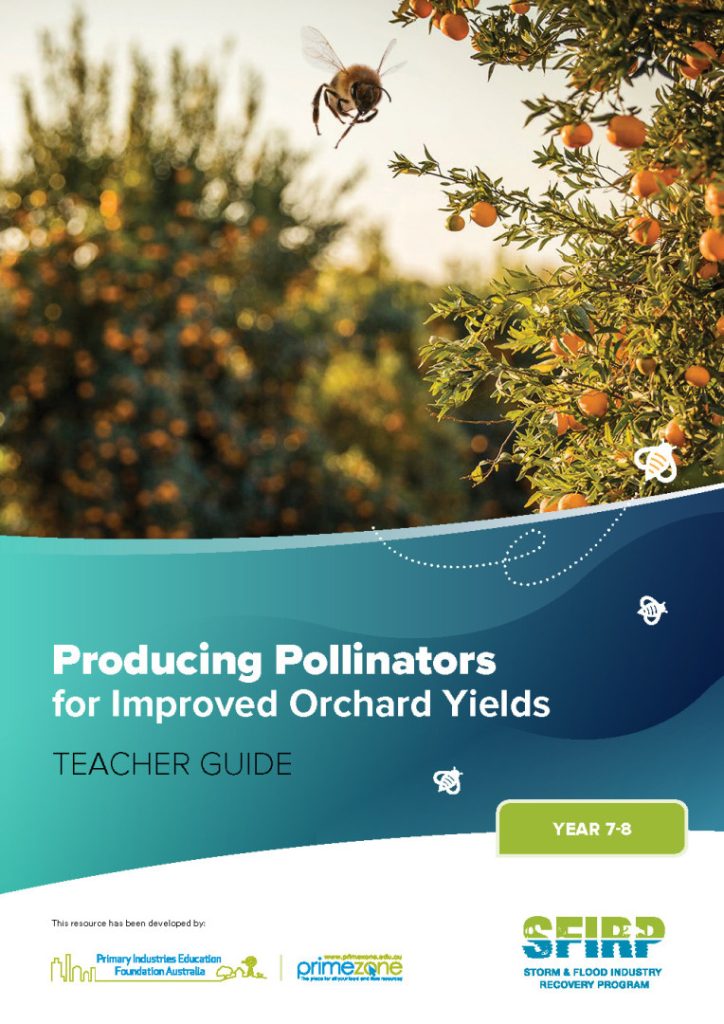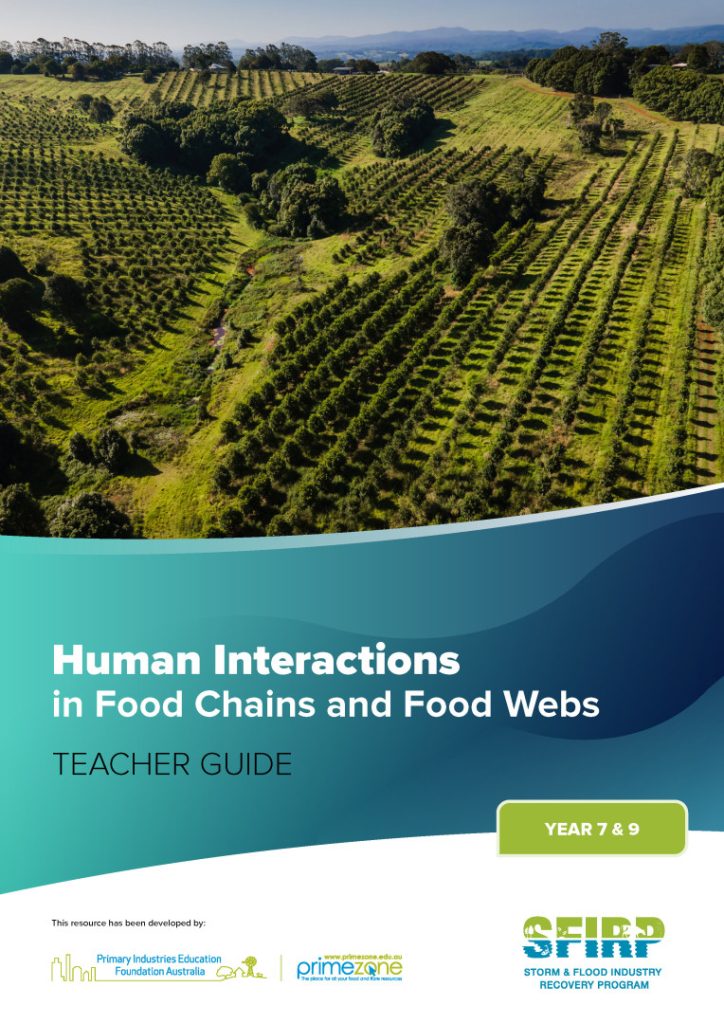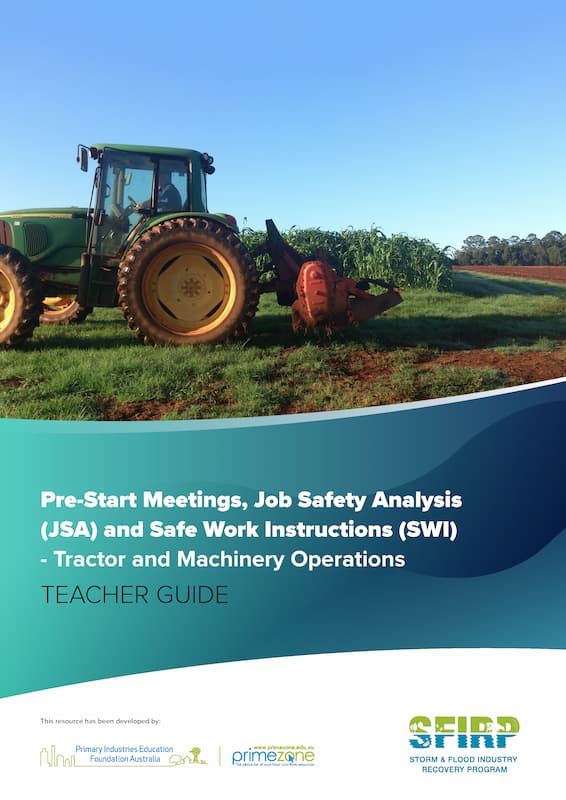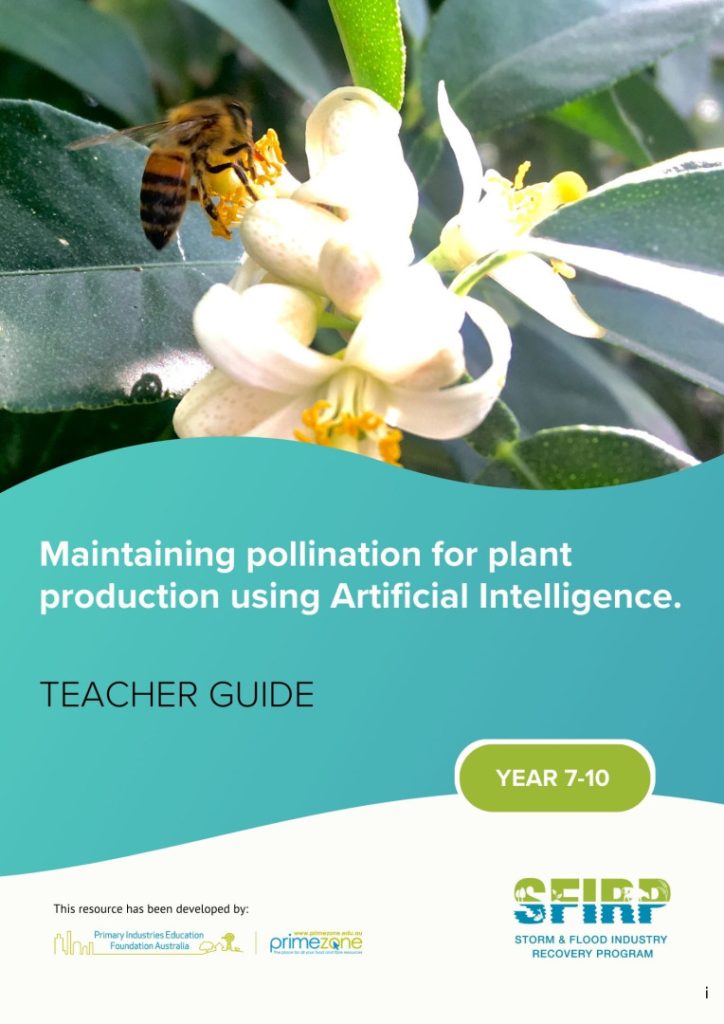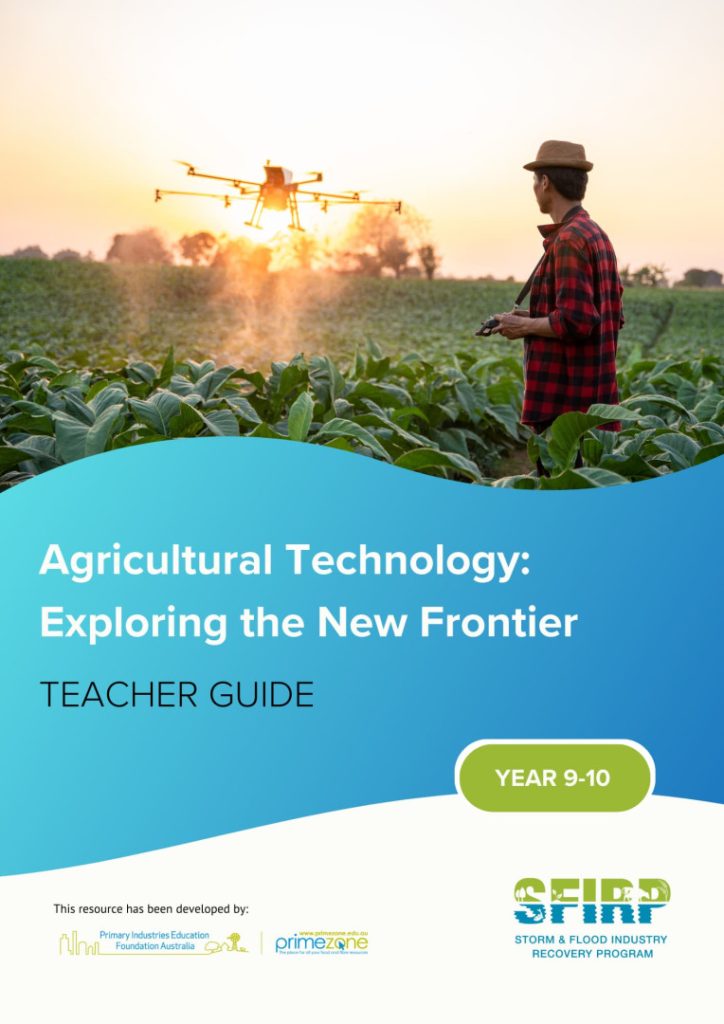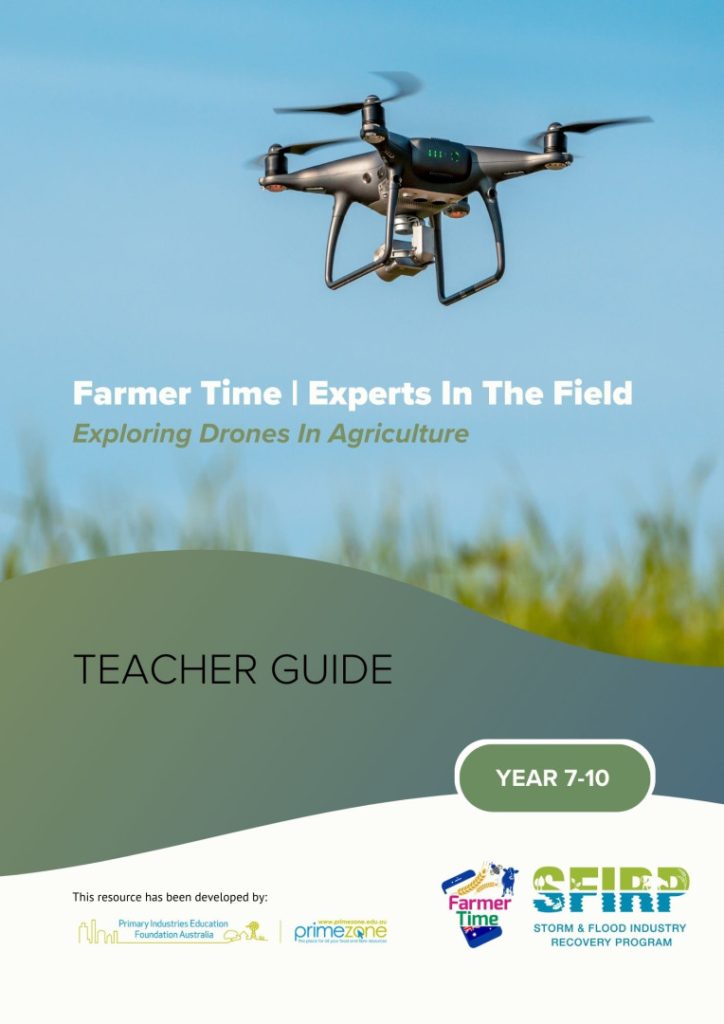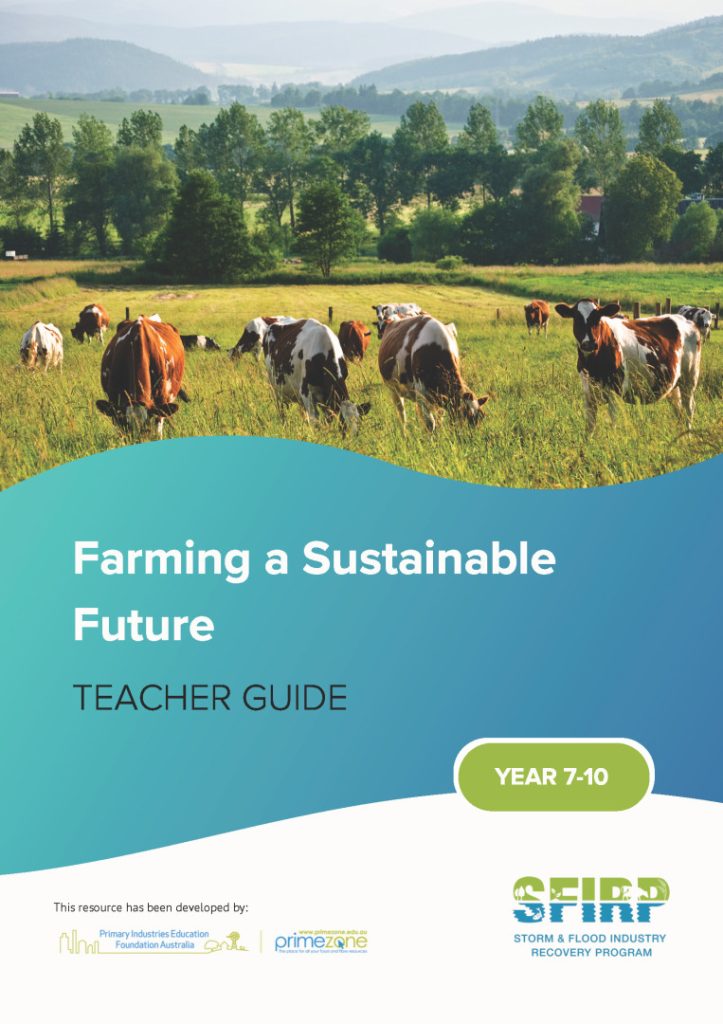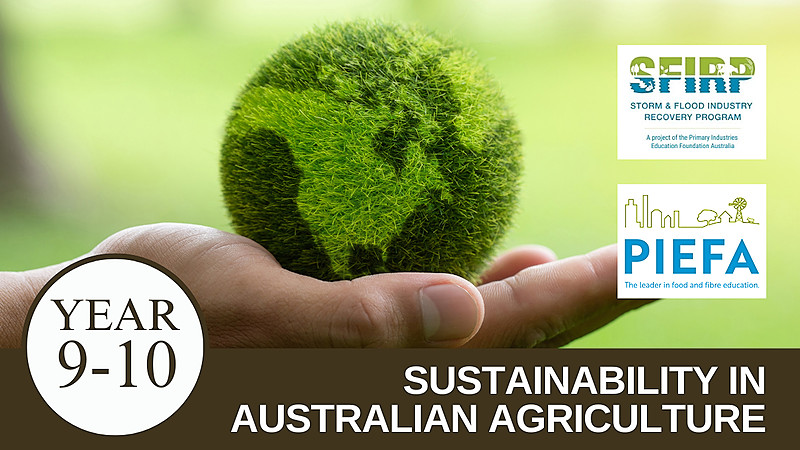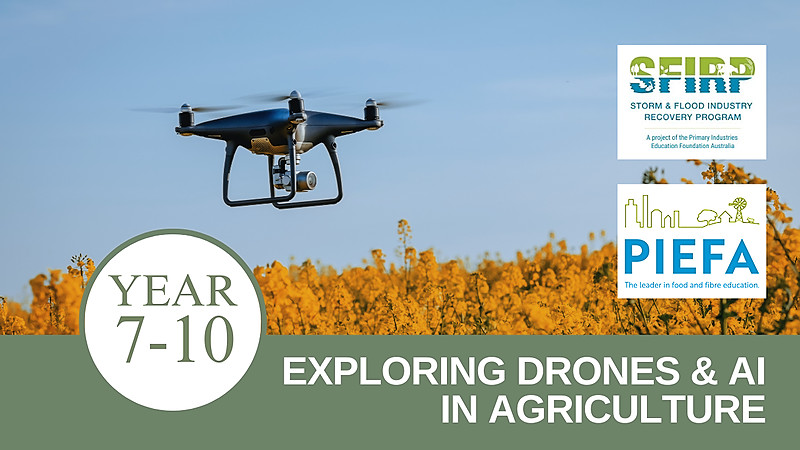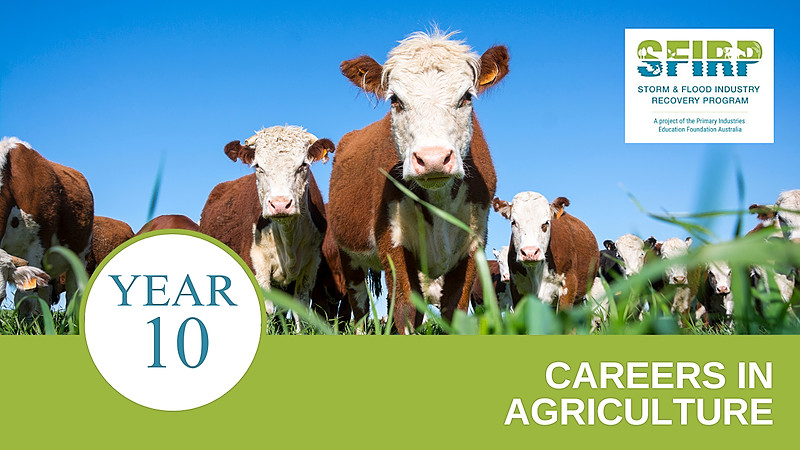STORM AND FLOOD INDUSTRY RECOVERY PROGRAM
Creating resilience through empowering school curriculums about primary industries careers.

PIEFA’s Storm and Flood Industry Recovery Program (SFIRP) is jointly funded by the Australian and NSW Governments under the Disaster Recovery Funding Arrangements through the Department of Regional NSW – Sector Recovery and Resilience Grants.
The project will improve community connectivity, linking schools with local primary industries and the many rewarding agricultural careers that are available in flood affected LGAs across NSW. By developing locally focussed teaching resources and careers programs, this project will deliver a stronger foundation to develop interest in local careers in the primary industries, building local resilience to improve recovery from flood disasters.
Contact
Ben Holmes, PIEFA SFIRP Project Manager
Email: Ben.holmes@piefa.edu.au Phone: 0480 458 220
Explore Storm & Flood Recovery Program Events & Resources
PLAN YOUR 2024 TEACHER/CAREER ADVISOR PD TODAY!
Explore upcoming NSW secondary school teacher and career advisor events
Join PIEFA’s Storm and Flood Industry Recovery Program for face to face workshops, online events, new food and fibre resources and more!
Across our events, you will take part in demonstrations and hear presentations from expert speakers. You will workshop new resources, develop your understanding of career opportunities available in the agriculture industry at entry, trade and graduate level and identify skills and training pathways for students.
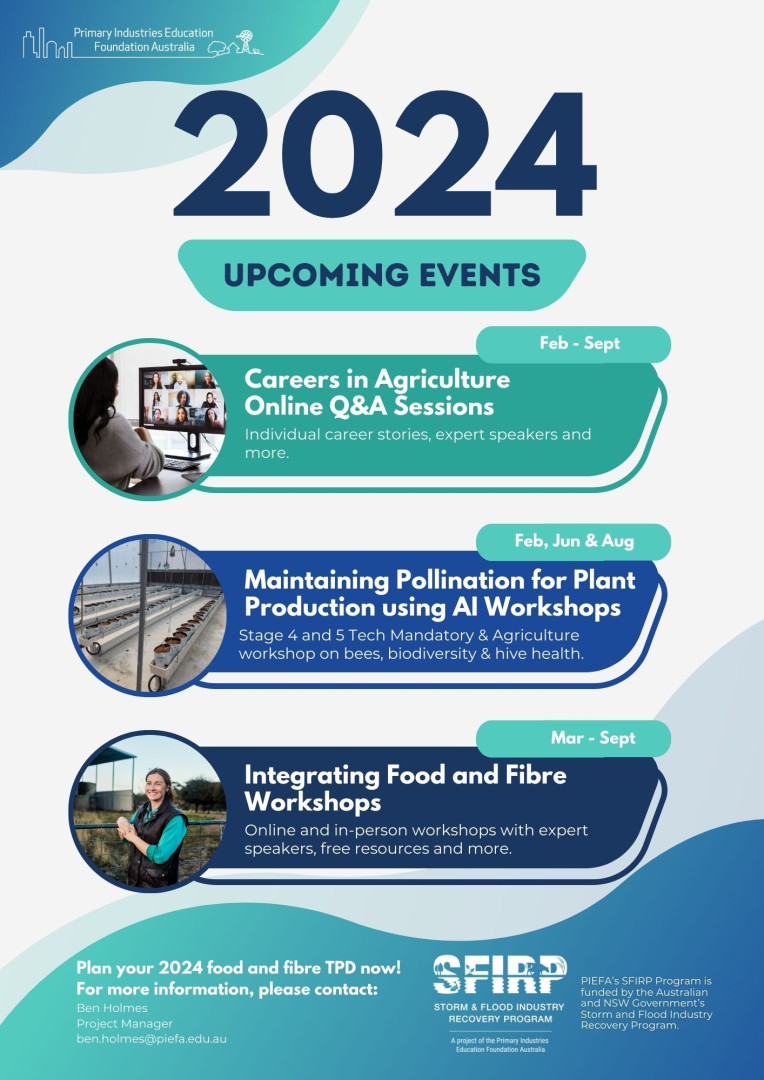
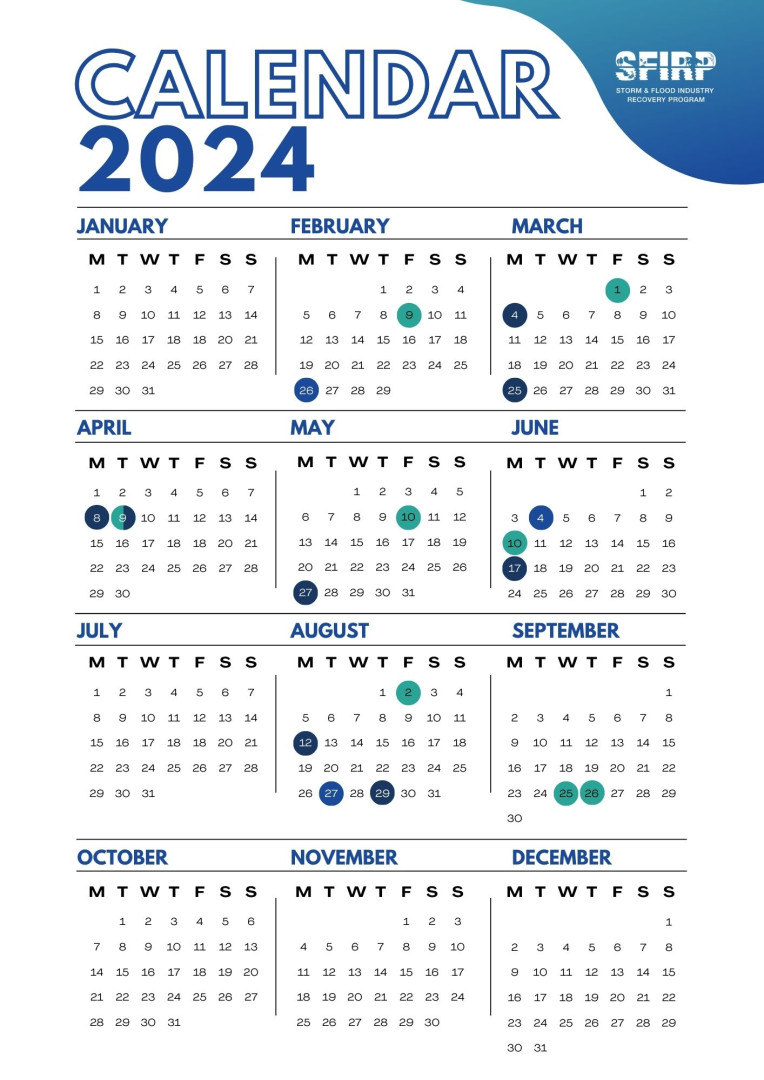
UPCOMING EVENTS
Free teacher professional development events for secondary teachers
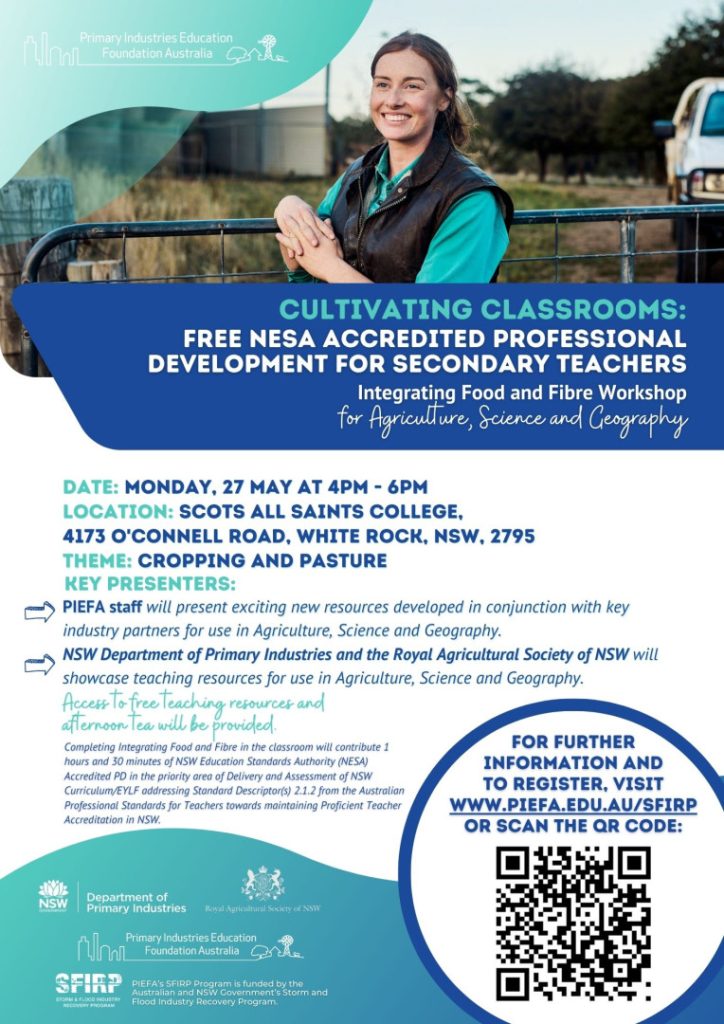
Cultivating Classrooms: Integrating Food and Fibre Workshop for Agriculture, Science and Geography Teachers
(NESA Accredited)
Theme: Cropping and Pasture
DATE: 27 May 2024, 4PM-6PM
LOCATION: Scots All Saints College, 4173 O’Connell Road, White Rock, NSW, 2340
NSW Department of Primary Industries and the Royal Agricultural Society of NSW will showcase DPI Secondary teaching resources for Agriculture, Science and Geography teachers. PIEFA staff will present exciting new resources, developed in conjunction with key industry partners.
Afternoon tea and access to free teaching resources will be provided!
REGISTRATION IS OPEN
(Please remember to check your junk email folder after registration for further details on this event
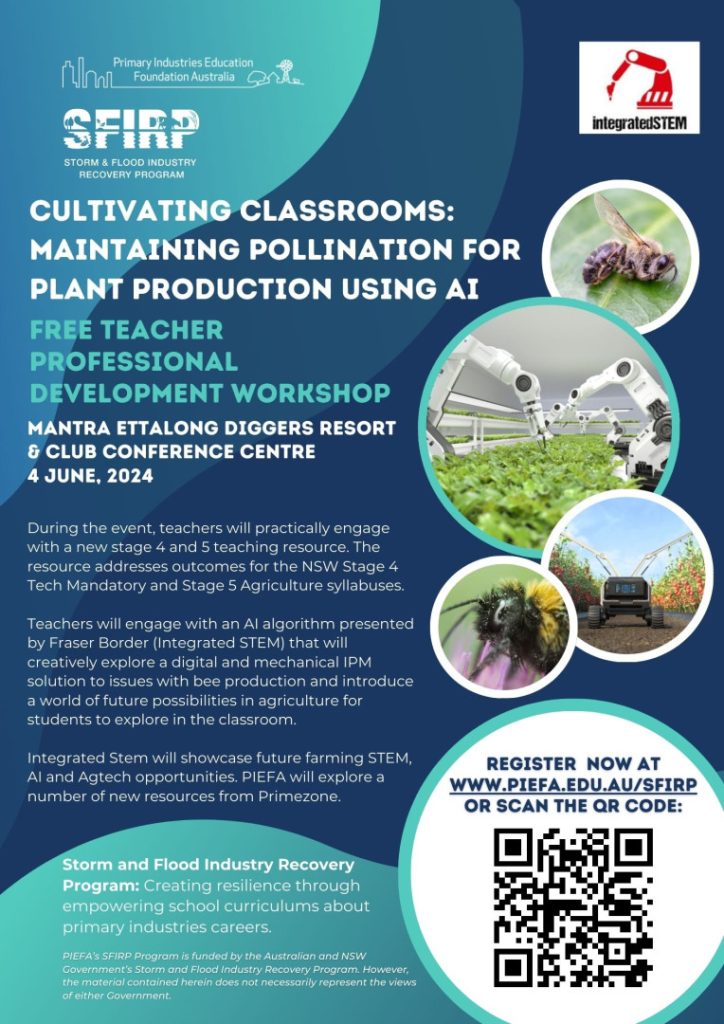
Cultivating Classrooms: Maintaining Pollination for Plant Production Using AI Workshop
DATE: 4 June 2024, 8AM-4PM
LOCATION: Mantra Ettalong Diggers Resort & Club Conference Centre
Join SFIRP and Integrated STEM for a one-day workshop exploring the use of AI to maintain pollination.
Participants will engage with an AI algorithm that will creatively explore a digital and mechanical IPM solution to issues with bee production and introduce a world of future possibilities in agriculture for students to explore in the classroom.
They will also hear from PIEFA, who will explore a number of new resources from Primezone.
Teacher relief, catering and teaching resources, including a new stage 4&5 resource, will be provided!
REGISTRATION IS OPEN
(Please remember to check your junk email folder after registration for further details on this event)
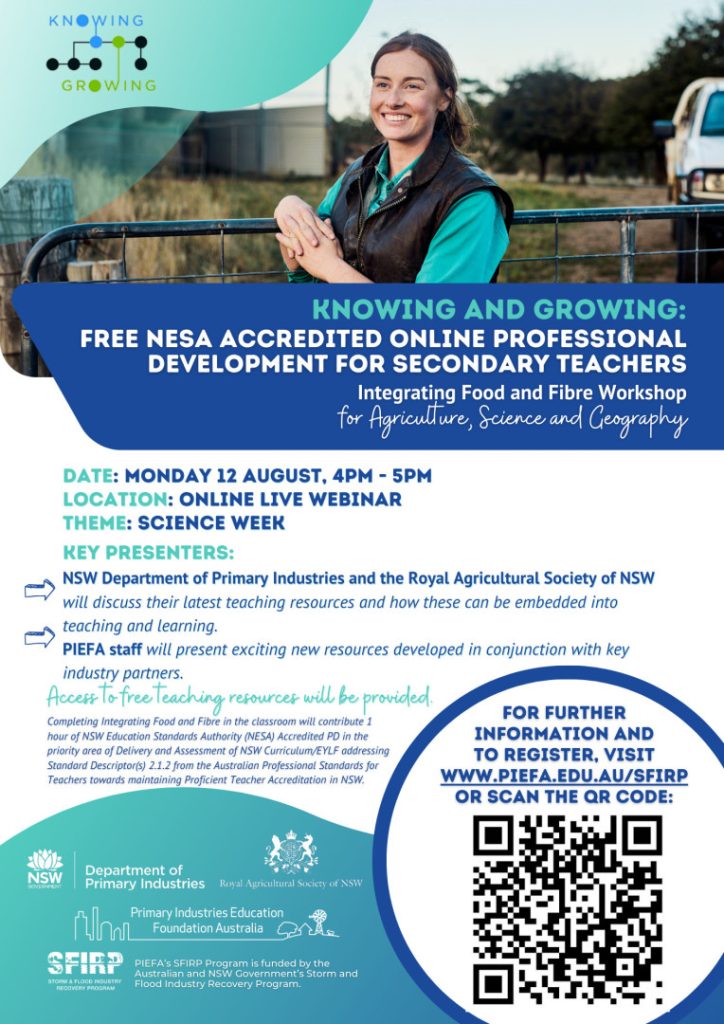
Knowing and Growing:
Integrating Food and Fibre Workshop
DATE: Monday 12 August 2024, 4PM-5PM
LOCATION: Online Live Webinar
NSW Department of Primary Industries and the Royal Agricultural Society of NSW will showcase DPI Secondary teaching resources for Agriculture, Science and Geography teachers.
PIEFA staff will present exciting new resources, developed in conjunction with key industry partners.
Afternoon tea and access to free teaching resources will be provided!
REGISTRATION IS OPEN
(Please remember to check your junk email folder after registration for further details on this event)
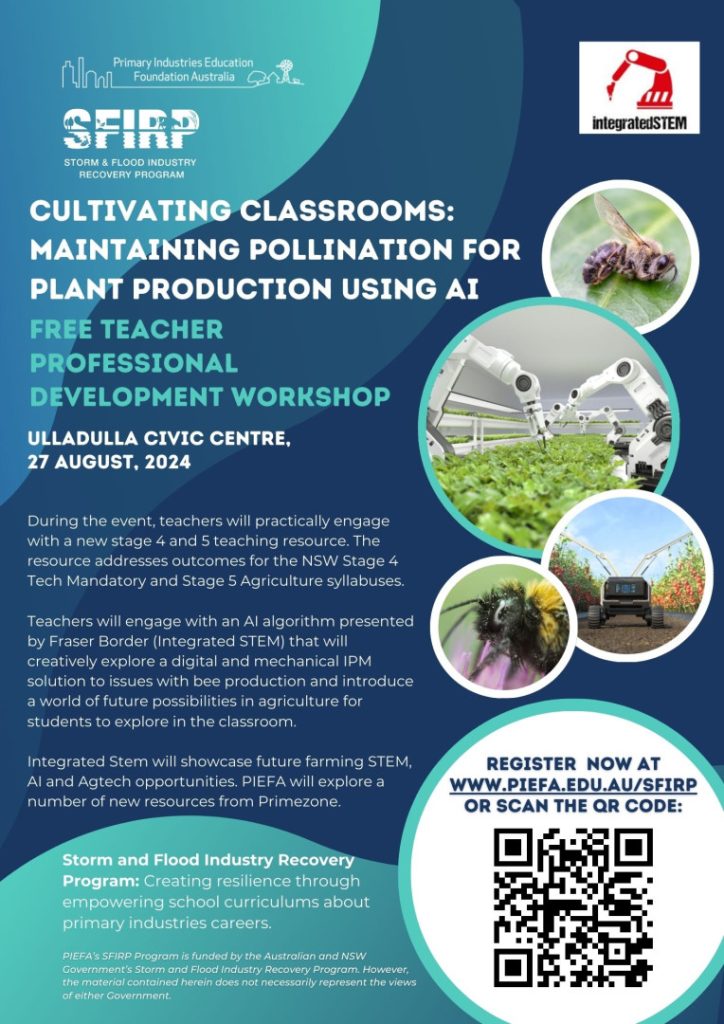
Cultivating Classrooms: Maintaining Pollination for Plant Production Using AI Workshop
DATE: 27 AUGUST 2024, 8AM-4PM
LOCATION: Ulladulla Civic Centre
Join SFIRP and Integrated STEM for a one-day workshop exploring the use of AI to maintain pollination.
Participants will engage with an AI algorithm that will creatively explore a digital and mechanical IPM solution to issues with bee production and introduce a world of future possibilities in agriculture for students to explore in the classroom.
They will also hear from PIEFA, who will explore a number of new resources from Primezone.
Teacher relief, catering and teaching resources, including a new stage 4&5 resource, will be provided!
REGISTRATION IS OPEN
(Please remember to check your junk email folder after registration for further details on this event)
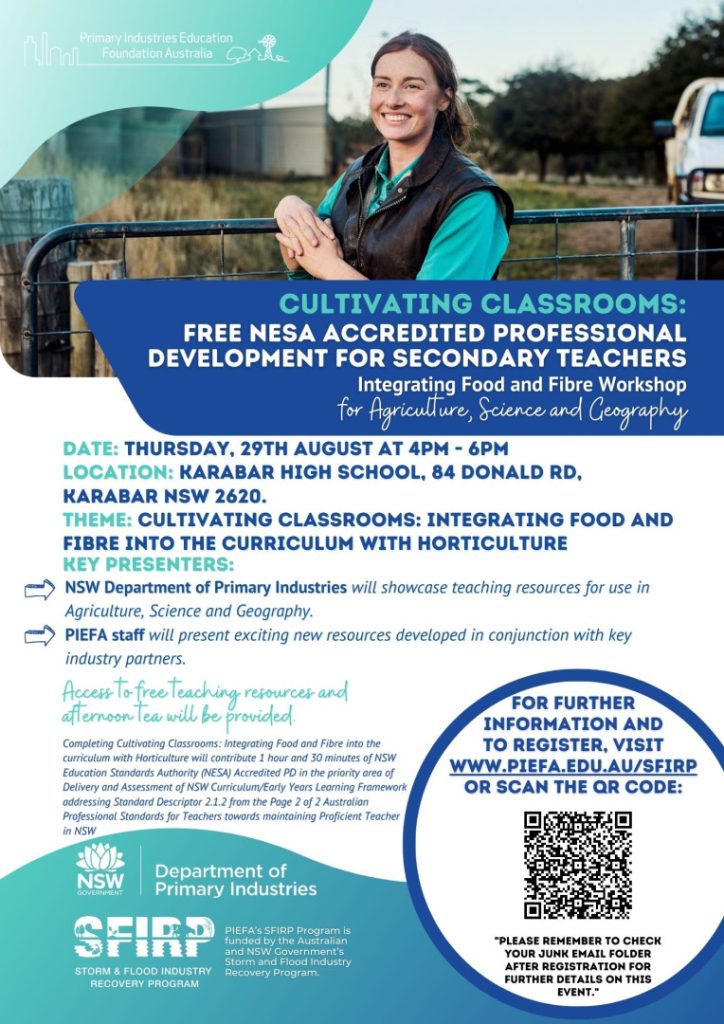
Cultivating Classrooms: Integrating Food and Fibre Workshop for Agriculture, Science and Geography Teachers
(NESA Accredited)
Theme: Integrating Horticulture into the Curriculum
DATE: 29 August 2024, 4PM-6PM
LOCATION: Karabar High School, 84 Donald Road, Karabar, NSW, 2340
NSW Department of Primary Industries will showcase DPI Secondary teaching resources for Agriculture, Science and Geography teachers. PIEFA staff will present exciting new resources, developed in conjunction with key industry partners.
Afternoon tea and access to free teaching resources will be provided!
REGISTRATION IS OPEN
(Please remember to check your junk email folder after registration for further details on this event
PAST EVENT RESOURCES
Explore 2023 SFIRP Event Resources
MID NORTH COAST CAREERS IN AGRICULTURE TOUR FOR CAREERS ADVISORS | APRIL 2023
The Mid North Coast Careers in Agriculture and Food Value Chains Tour was a 2-day workshop across flood-affected areas on NSW. The event took place in April 2023 and showcased a variety of careers and career pathways across multiple locations including Coffs Harbour, Bellingen, Dorrigo, Kempsey and Port Macquarie. 26 teachers and Careers advisors attended.
A Careers in Agriculture poster was developed with RDAMNC and a Career Harvest teaching resource to support students investigating careers in agriculture was also developed.
HUNTER VALLEY CAREERS IN AGRICULTURE WORKSHOPS
The Hunter Valley Careers in Agriculture Workshops event was a two-day tour of NSW Department of Primary Industries sites, run in collaboration between PIEFA and NSW DPI.
The event took place November 30-December 1, 2023 and included tours and presentations. Teachers’ understanding of career opportunities in primary industries was developed.
BANYULA FARM FIELD DAY | JULY 2023
This event was a collaborative between Banyula Farm, Southern Cross University and PIEFA. 43 teachers attended presentations on regenerative farming and workshopped a series of teaching resources targeting curriculum for agriculture, primary industries, science and geography.
FARMING IN THE DIGITAL AGE AT UNE | OCTOBER 2023
This event was a collaboration between PIEFA and the University of New England (UNE). Attendees toured UNE sites and facilities and heard from speakers from PIEFA, UNE, Dairy NSW, Gallagher and John Deere.
INTEGRATING FOOD AND FIBRE WORKSHOPS | 2023
Cultivating Classrooms and Knowing and Growing Integrating Food and Fibre Workshops introduced secondary teachers to a broad range of topics and guest speakers. Teachers were also presented with a range of new educational resources.
Explore 2024 SFIRP Event Resources
MAINTAINING POLLINATION FOR PLANT PRODUCTION USING A.I WITH INTEGRATED STEM WORKSHOPS
These events were a collaboration between PIEFA and Integrated STEM. They were held over three events at Richmond, Ettalong and Ulladulla. Resources included a Teacher’s Guide and Student Worksheets.
TEACHING RESOURCES
Explore Agricultural themed Teaching Resources
PROTECTING POLLINATORS | TEACHING RESOURCE
HUMAN INTERACTIONS | TEACHING RESOURCE
Producing Pollinators for Improved Orchard Yields is a year 7-8 resource that introduces students to the importance of pollinators for improving orchard yields, human management of bees for orchard pollination and the impacts of farm management on the sustainability of a farm enterprise.
This teacher guide consists of 3 activities (and extension activities), worksheets and answer guide. These activities will build students’ vocabulary and knowledge around pollinators and their impact on food production, assist them to develop ideas to solve existing problems, and design and build their own pollinator habitat box.
Human Interaction in Food Chains and Food Webs aligns to year 7 science and year 9 geography curricula. This resource introduces students to food chains, food webs, and how human activities can affect the interactions within these systems. Students will design a food chain and food web based on the ecological interactions on Banyula farm. An overarching theme of sustainable ecosystems will be embedded throughout the lesson, along with the influence of science on agricultural practices and the management of environments.
This teacher guide consists of 3 activities (and extension activities), worksheets and answer guide. These activities will improve student’s knowledge and vocabulary around food chains and webs and will discover the regenerative agricultural practices utilised at Banyula farm.
REDUCING FLOOD RISKS | TEACHING RESOURCE
PRE-START MEETINGS | TEACHING RESOURCE
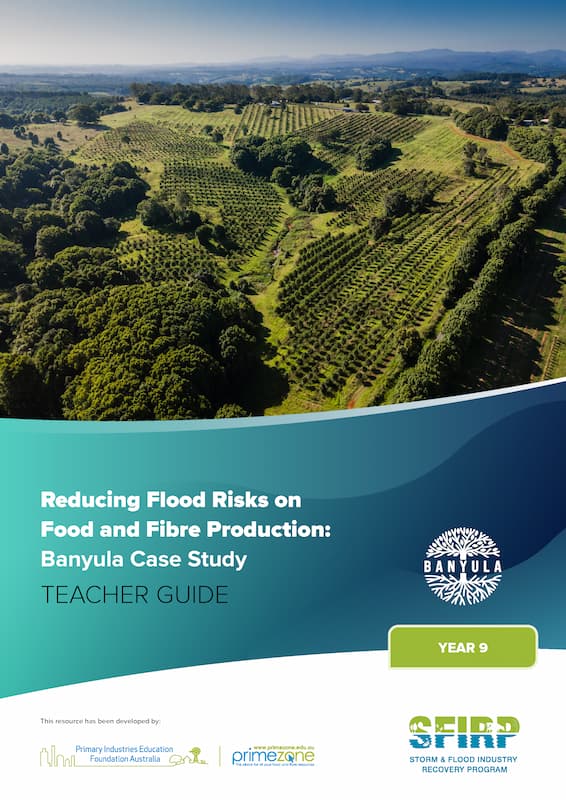
Reducing Flood Risks on Food and Fibre Production: Banyula Case Study is a year 9 geography resource that will help students identify agricultural land at risk of flooding using satellite images and mapping. They will identify solutions in relation to land use and cropping choice to ensure sustainable food and fibre production.
This resource consists of 3 activities, worksheets and answer guide.
Pre-Start Meetings, Job Safety Analysis (JSA) and Safe Work Instructions (SWI) – Tractor and Machinery Operations aligns with Stage 6 VET Primary Industries and Stage 5 and 6 Agriculture curricula. Students will learn the knowledge and skills required to carry out enterprise work health and safety policies and procedures.
This teacher guide consists of two activities, worksheets and answer guide. These activities will improve students knowledge of workplace health and safety procedures, hazards and directions.
MAINTAINING POLLINATION FOR PLANT PRODUCTION USING AI | TEACHING RESOURCE
AGRICULTURAL TECHNOLOGY | TEACHING RESOURCE
Maintaining Pollination for Plant production using AI is aligned to the Producing Pollinators for improved Orchard yields teaching resource. This teacher guide and printable student worksheets are aligned with content from the Stage 4 Technology Mandatory, Stage 4 Science, Stage 5 Agricultural Technologies, Science, Geography, and ISTEM courses.
The teaching resource follows the 5E model of pedagogy exploring the role of pollinators in food production, challenges, biodiversity, sustainability, innovation and technological solutions to a current agricultural issue. Students will engage in a series of 5 activities and produce a video record of their teamwork which could be used as a form of summative assessment of learning.
Agricultural Technology: Exploring the New Frontier aligns to year 9 and 10 geography, design and technologies and digital technologies (Australian curriculum) and stage 5 agricultural technology and year 9 sustainable biomes (NSW curriculum). This resource introduces students to the history of agriculture, current Australian farming practices and the role that technology plays within the food and fibre sector.
This resource consists of 3 activities (and an optional extension activity), worksheets and answer guide. These activities will expose students to past farming practices, how new technology can resolve issues and challenges faced by producers, build their vocabulary and share existing knowledge and ideas about agriculture and the future of farming in the digital age. Career opportunities will also be explored.
FARMER TIME | EXPERTS IN THE FIELD | TEACHING RESOURCE
FARMING A SUSTAINABLE FUTURE | TEACHING RESOURCE
Farmer Time | Experts In The Field – Exploring Drones in Agriculture aligns with year 7-10/stage 4-5 Science, Agricultural Technology and Design & Technology curricula.
Students will engage with four drone experts, focusing on the innovative ways drone technology in agriculture is used to improve efficiency, sustainability, and precision farming practices.
This teacher guide consists of four activities, worksheets and answer guide. These activities will develop students’ knowledge and appreciation of Australian agricultural production and the impacts of drone technology on the ongoing development of agriculture in the country.
Farming a Sustainable Future Worksheet provides a Stage 4 and 5 Agriculture-aligned activity for schools and classrooms with access to a KinetiKit. The worksheet provides instructions for the building of the KinetiKit and investigates grazing methods, stocking rates and sustainable farming practices.
SEED PACK | EDUCATIONAL RESOURCE
SUBJECT SELECTION TOOL | EDUCATIONAL RESOURCE
Teaching resource: Subject Selection Tool supports secondary teachers to introduce their students to the variety of roles available in the agricultural sector.
The classroom resources consist of a poster and PowerPoint presentation. The first few slides of the PowerPoint presentation are aligned to the NSW curriculum, however the remaining content is applicable to teachers across the country.
CAREERS IN AGRICULTURE VIDEOS
Career Q&A Video Sessions Digital Learning Kits
These Career Q&A Digital Learning Kits have been designed to showcase the diverse career pathways and opportunities within agriculture. Each kit contains 3 videos and an associated resource.
Traditional Farming Digital Learning Kit
This Digital Learning is centered around Traditional Farming, with a particular focus on the cotton industry.
Discover Exciting Careers from our Industry Partners
Learn about the range of opportunities available in the Australian Agricultural Industry.
Mid North Coast Event Videos
UNE Farming in the Digital Age Event Videos
SFIRP PRIMEZONE ACADEMY COURSES
Discover free online Agricultural focused courses for your students
PIEFA’s Primezone Academy is the new PIEFA teaching and learning online course website. Here you will find interactive agricultural science courses your students can enrol into for free.
PIEFA’s SFIRP Program is funded by the Australian and NSW Government’s Storm and Flood Industry Recovery Program.
Although funding for this product has been provided by both Australian and NSW governments, the material contained herein does not necessarily represent the views of either Government.
Get Involved
Will you help change the future of agriculture?
Support ag studies & food and fibre education across all grades of Australian school.
become a partner
Help your organisation reach more students
Let’s work together to get your passion for agriculture to more schools so that they can educate the future leaders we need to grow the farming, fishing and forestry community.

